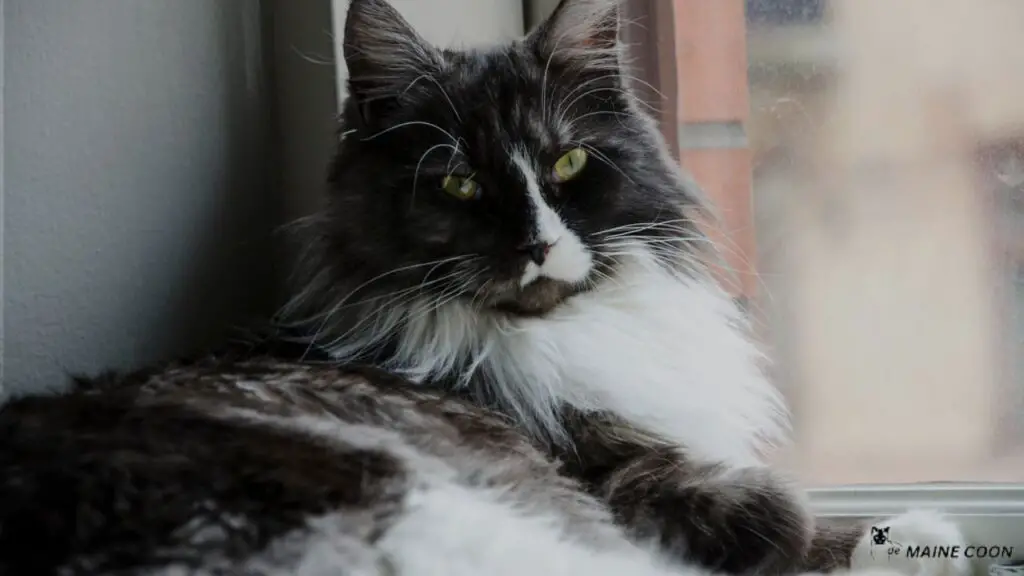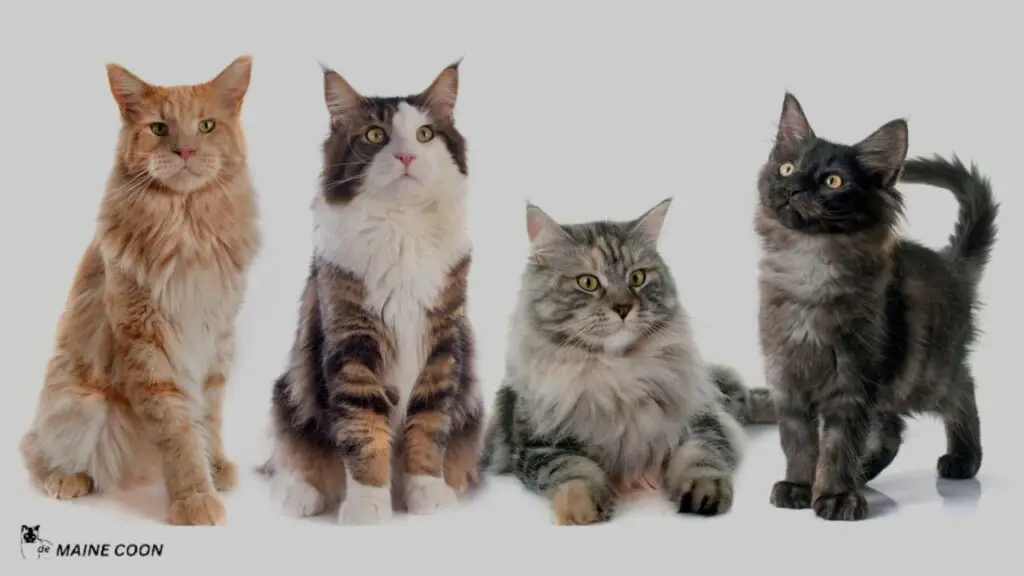Is the Maine Coon Hypoallergenic? Vet-Approved Allergy Facts & Prevention Advice
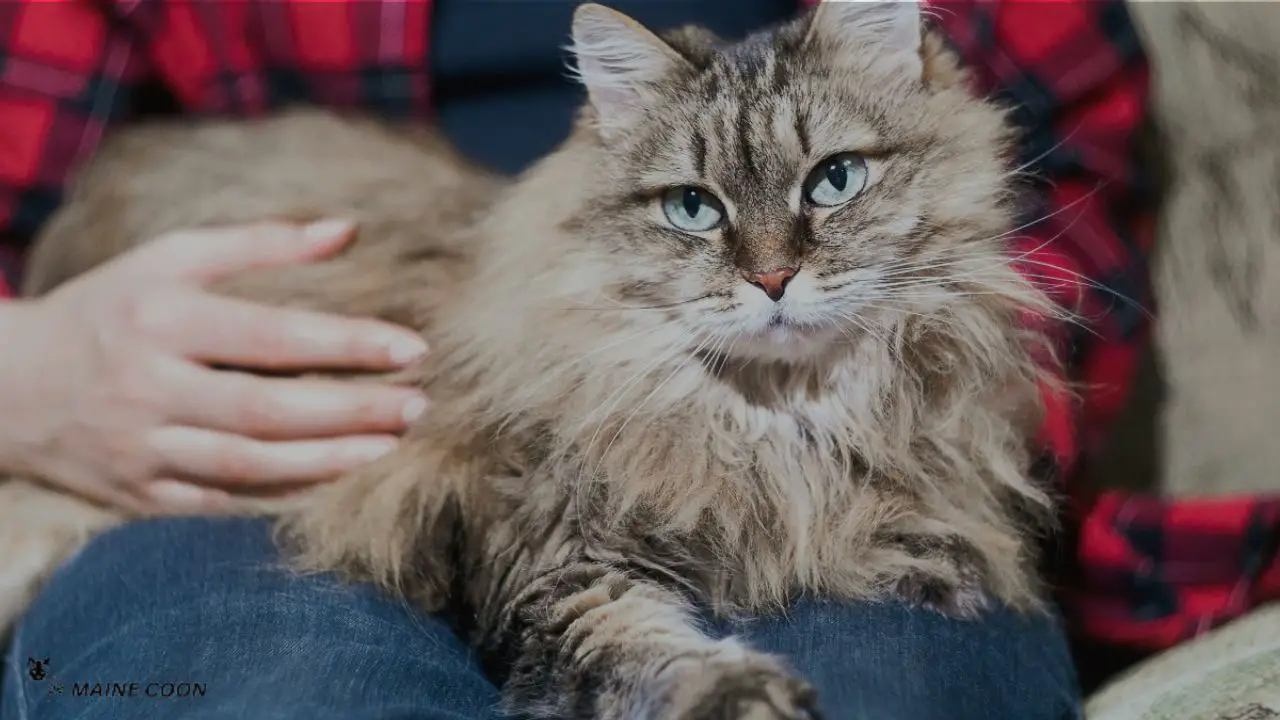
If you desire to get a Maine Coon cat but suffer from various allergies, keep reading to discover if your allergies will stop you from owning a Maine Coon cat.
So, is the Maine Coon hypoallergenic? Keep reading because the answer may surprise you!
Maine Coons are not hypoallergenic because they produce the protein called Fel d 1, which leads to allergies in some people. You can reduce cat allergens by bathing and grooming your cat frequently. If you are very allergic to cats, do not purchase a Maine Coon cat. Consider Hypoallergenic cat breeds such as Siberian or Sphynx as they produce lower levels of Fel d 1 protein.
Suffering from allergies is never enjoyable, especially when you become allergic to a cat breed you love or, even worse, a cat you already have. It can make you feel like your options are pretty restricted.
If someone who likes cats develops a severe allergy to their cat, they may have to consider finding a new home for their furry Maine Coon cat through adoption.
What does ‘Hypoallergenic’ Mean For Cats?
Hypoallergenic means that an animal has fewer potentially irritating substances than other animals, making it less likely to cause allergic reactions. A few cats make a protein that can lead to reactions in people with cat allergies or sensitivities. The finest way to check if your cat is hypoallergenic is by using tests available online or at your veterinarian’s office to see if your cat makes these proteins.
Is the Maine Coon Hypoallergenic?
The Maine Coon cat isn’t hypoallergenic, meaning it’s not suitable for those with cat allergies. Their large size and plenty of fur make them produce allergens like other cats, which can cause allergic reactions in a few persons. Still, with some care and attention from both the cat and the person, the Maine Coon cat can be enjoyed by those with allergies to cats and also by those without allergies at all!
Expert opinion says that Maine Coons may not be an issue if you have mild allergies. However, if you have severe asthma or respiratory problems, then they might not be suitable for you.
Read Also: Do Maine Coons get along with dogs.
What Leads to Cat Allergies?
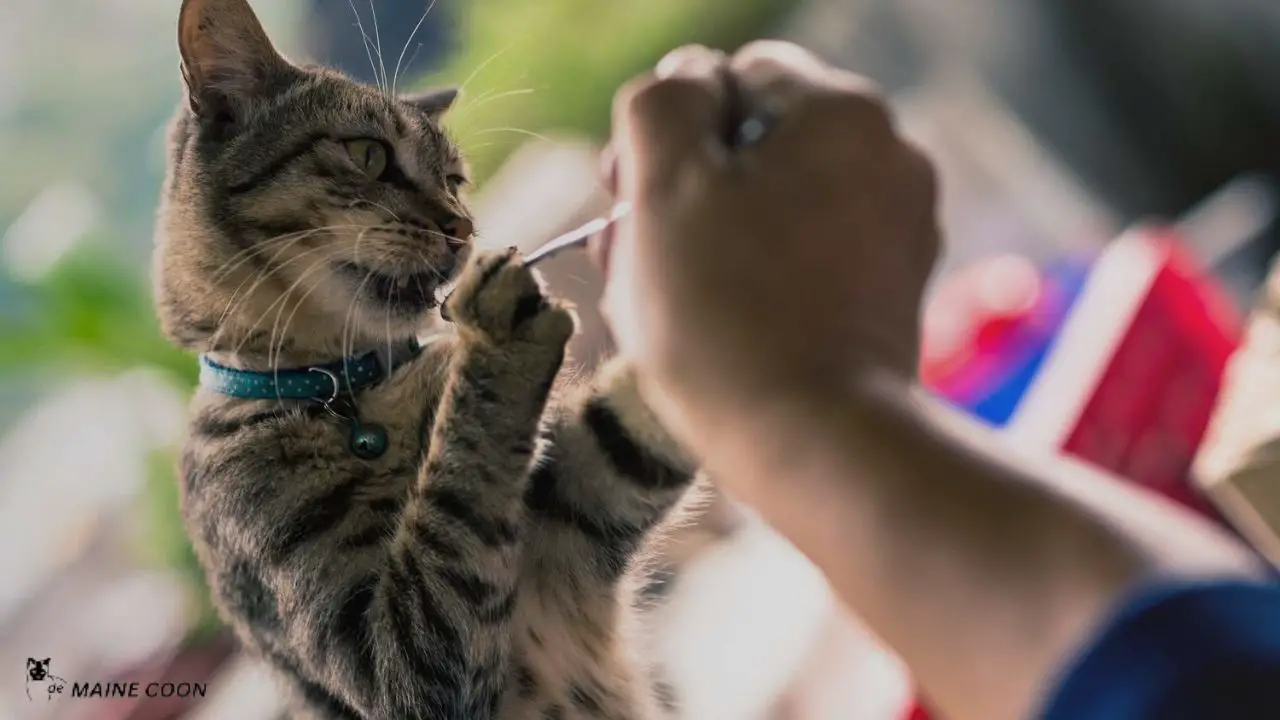
Cats secrete special proteins from their skin glands, such as Fel d 1, Fel d 2, and Fel d 4. These proteins may lead to an allergenic reaction in people. When cats groom themselves, these proteins go into the air, and if you’re allergic, you may breathe them in.
Fel d 1, Fel d 2, and Fel d 4 proteins can be discovered in:
- Urine
- Saliva
- Skin
- Fur
- Tears
- Feces
- Mucous
- Dander (dead skin cells)
Research indicates that around 80% to 90% of individuals are allergic to Fel d 1 protein, with a miner percentage being sensitive to Fel d 2 and Fel d 4 proteins too.
Are Cat Allergies Ordinary?
Numerous people have cat allergies, but they may not be sure why. In fact, around 10% of the population have pet allergies.
As per the American College of Allergy, Immunology, and Asthma, cats are the primary cause of allergies, and cat allergies are double as ordinary as dog allergies.
This scientific study in America discovered that the protein Fel d 1 is present in 99.9% of homes with a cat.
The Fel d 1 protein was seen on the dust on clothes, carpets, sofas, etc.
The protein is effortlessly airborne, spreading throughout the home without much problem. Specialists suspect it can even move through hair strands.
Interestingly, the Fel d 1 protein was found in American homes even without owning any cats.
The study also detected high levels of Fel d 1 in offices, cars, classrooms, and shopping centers. These levels were thought to be spread via cat owners’ hair and clothes into public spaces.
It could assist in clarifying why allergy sufferers may experience difficulties with their allergies in unexpected locations.
See Also: How to tell if your cat is a Maine Coon.
What kind of Symptoms Can a Cat Allergy Sufferer Display?
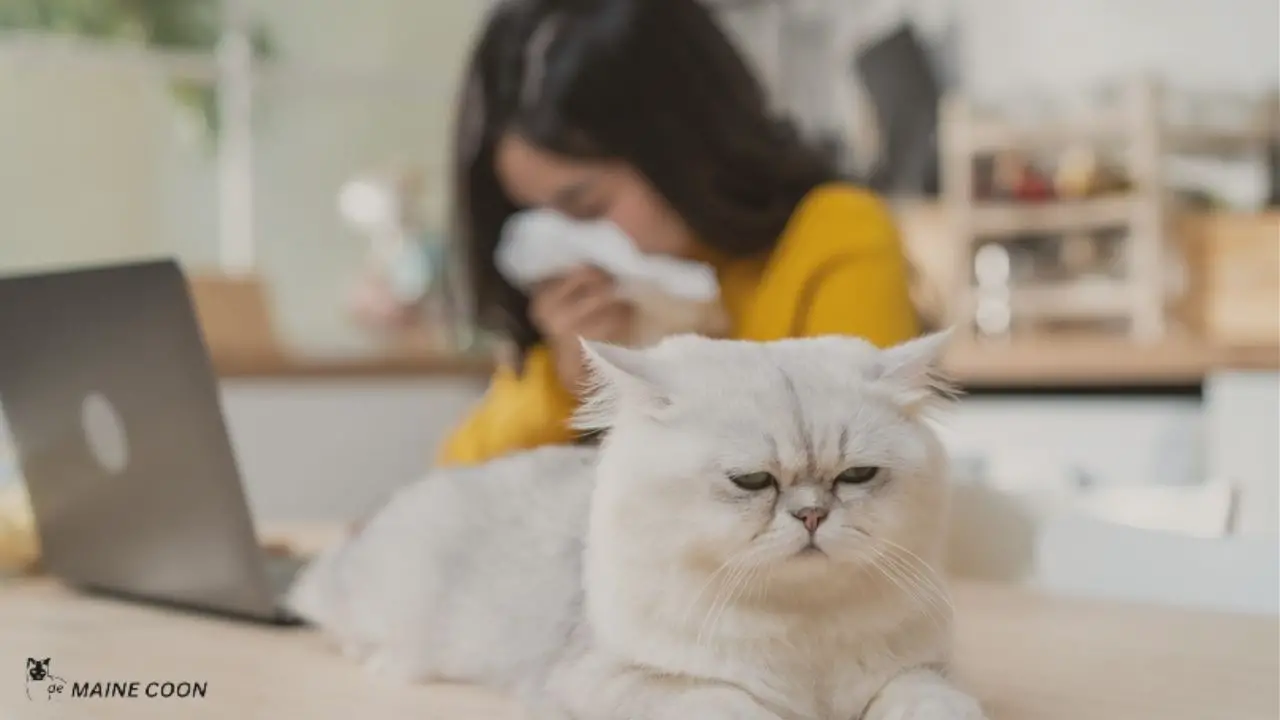
If you’re thinking about whether you’re allergic to your cat or not, check out this list of ordinary cat allergy symptoms.
- Wheezing
- Watery eyes
- Itchy skin
- Sneezing
- Coughing
- Runny nose
- Soreness in the throat and mouth
Other symptoms may involve stuffy noses, hives, and red eyes. In a few cases, individuals with severe reactions may experience loss of consciousness or dizziness. That’s why anybody with cat allergies needs to take precautions when they’re near cats.
The signs of an allergic reaction vary depending on the severity of the allergy. A highly sensitive person might experience signs right away, whereas certain people might get a reaction within 4 to 8 hours after exposure. Symptoms could last for a few minutes or up to a few hours.
If you have asthma, you’re more susceptible to an allergic reaction from cat allergens. This is because asthma leads to hypersensitivity in the respiratory tract as well as inflammatory responses to allergens.
How to Check if You Have Allergies To Maine Coons?
If you’re considering that Maine Coons may not be the right pet for you and you’re curious how to know if you are allergic to Maine Coon cats, here are some steps you can take to find out:
- Communication With Maine Coon: You can spend some time with a Maine Coon cat to see if you feel awkward or if allergy signs come back again. Secondly, a visit to a shelter or breeder where you can interact with Maine Coon cats they have available for adoption is another fine way because it assists you in assessing if you have any allergic reactions in a real-life setting.
- Get An allergy Test: If you desire to know whether you are allergic to a specific cat breed, the quickest way is to get tested by a pathology lab. Nowadays, numerous veterinarians offer allergy testing, particularly for certain breeds, such as Maine Coon cats.
You may also be interested in: Maine Coon Behavior Problems.
How To Reduce Maine Coon Cat Allergies
Maine Coon cats are a famous choice among pet owners. If you’re determined to get one despite potential allergies, there are ways to reduce reactions. But, it’s essential to note that if you have a severe allergy, it’s fine to keep away from adopting a cat, as it’s not possible to have an allergy-free cat.
You can follow one or more of these tips to assist in managing allergic reactions.
- Consult Your Doctor
- Bathe The Cat
- Brush The Cat Daily
- Wash Your Hands Frequently
- Minimize Touching Your Cat
- Clean Your Home
- Use Gloves While Gardening
- Add Air Filters to Improve Air Quality
- Create House Rules
- Apply Allergen-Minimizing Spray
- Maintain a Litter Box Clean
- Prevent Cat Licking
- Wear a Mask
- Get a Female or Neutered Male
1. Consult Your Doctor
It’s advisable to consult a medical doctor for an assessment and prescription of suitable anti-allergens medication appropriate for you. These medications will assist you in managing the symptoms while living with your Maine Coon.
Antihistamines or decongestant sprays can be acquired to help deal with triggers. In cases of severe allergies, your doctor can recommend immunotherapy for a more long-term fix.
2. Bathe The Cat
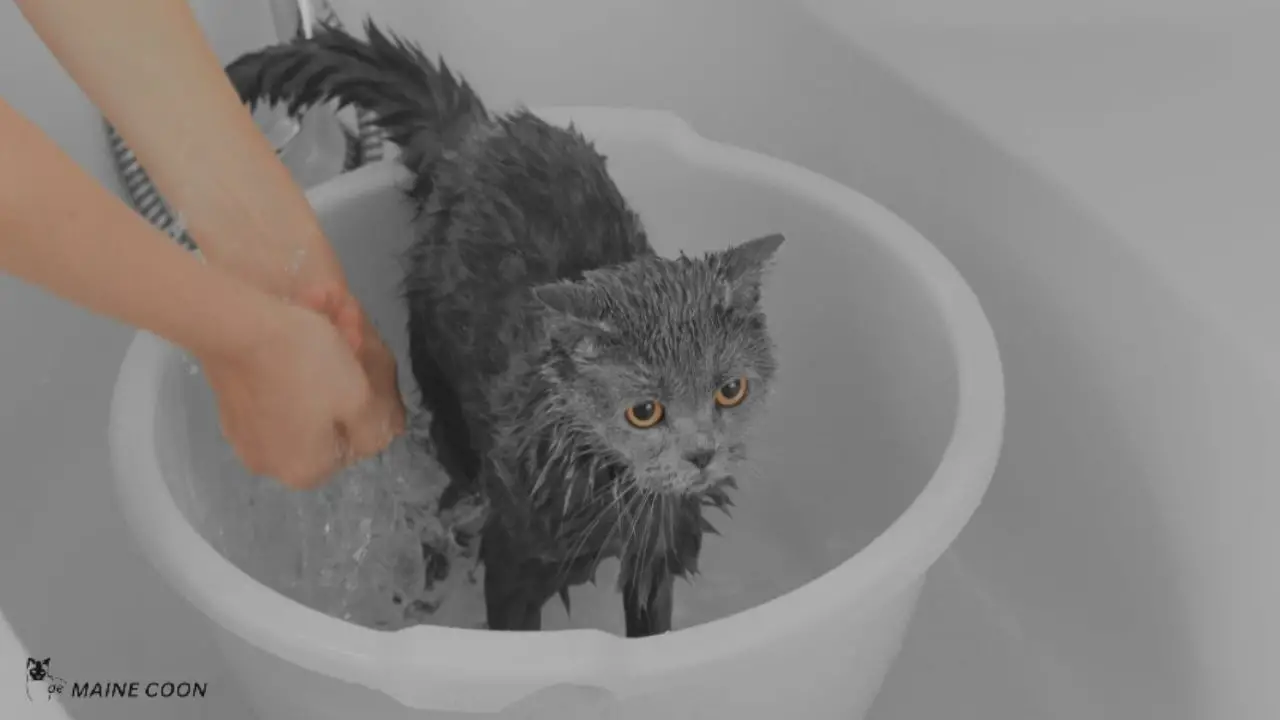
Providing your cat with a bath can assist in removing excess protein trapped on the fur coat. However, research indicates that this approach only temporarily minimizes the amount of dander on your cat’s coat, generally for around 2 to 3 days. Whereas it might not give a long-term fix, it can be a viable choice if you have a friend with cat allergies coming over for a few days.
The advantage of this is that some Maine Coon cats often love water, making it simpler to bathe them daily. When washing your cat, make sure to use cat-specific shampoo to avoid skin irritation.
3. Brush The Cat
Brush your cat’s fur regularly if possible. Maine coon cats require occasional grooming to avoid matting. Brushing your cat will remove excess dander from the fur before it spreads throughout your home. If brushing is challenging due to allergies, try wearing a mask or having a professional groomer or friend perform this task for you. After the session, neat the brush thoroughly and wash your hands before touching your face. It may assist in limiting the amount of allergen on your body.
4. Wash Your Hands Frequently

Petting your cat is a fun and bonding experience for you as well as your feline friend. To prevent contact with allergens, make it a practice to wash your hands regularly, especially after touching your cat’s coat. The protein from the saliva gets stuck in your hands every time during groom your cat, so it’s necessary to wash them thoroughly after each session.
5. Minimize Touching Your Cat
By minimizing the frequency of touching your cat, it helps reduce contact with allergens. If feasible, try as much as possible to pet your cat less. However, it’s vital to be aware that this is not a satisfactory long-term fix for your cat. If your cats don’t have other socialization opportunities, it’s not advisable to use this method as a form of controlling your signs.
6. Clean Your Home
If you have a Maine Coon cat living in your home, there may be factors that lead to allergies. It would be best if you made your home as allergy-free as you can to reduce allergy signs. If feasible, try to clean your home really well. Use a vacuum to remove allergens from the floor. Clean the carpet every day by washing it with shampoo, making use of a vacuum, and cleaning any spots you notice.
Also, ensure to daily wipe down any sturdy surfaces with a damp cloth or sponge using a mild soap solution.
If you can, open windows and curtains for a few hours each day. It assists fresh air circulating through the house and dries any damp surfaces from cleaning.
7. Use Gloves While Gardening

Even if you have a particular litter box, cats may still urinate in the garden. When gardening, use gloves to avoid coming into contact with urine that might contain allergen proteins.
8. Add Air Filters to Improve Air Quality
Allergens can be airborne and lead to a lot of sneezing. To keep the air in your home free of allergens, make use of air purifiers. Ensure to change the cleaners every day to keep your home neat and clean.
9. Create House Rules
The Majority of cat owners love to snuggle with their pets on the beds, especially at night. Maine Coon cats leave allergen all over your bed and sheets, which will come into touch with your body.
Rather than allowing the cat to roam freely throughout the entire house, set rules and train them to stay away from areas such as the bedroom. This approach will minimize your encounter with allergens.
10. Apply Allergen-Minimizing Spray
Exposure to cat coats and dander can lead to allergies and asthma in the majority of people, so it’s necessary to maintain a neat and clean environment. One efficient method is to use allergen-minimizing sprays that neutralize allergens, preventing them from provoking asthma attacks or a flare-up of allergies. Spray your home surfaces before vacuuming to eliminate allergens proteins.
11. Maintain a Litter box Clean
Allergens might be found in your Maine Coon’s urine. To prevent contact, it’s advisable to have a non-allergic family member who empties and cleans the litter box.
In certain situations, you may be allergic to the litter. Certain litters accessible at present come with fragrances, dust, or chemical irritants, all of which can trigger an allergic response. If your Maine Coon cats use such litter, particles might get stuck on their big fur and be distributed around your home surfaces.
To eliminate these triggers, swap to a hypoallergenic litter like pine, corn, or paper litter.
12. Prevent Cat Licking
While the act of cats licking their can be fun, it may also transfer allergens. Fel d 1 protein is available in cat saliva, which might cause allergic reactions. So, to reduce this, owners should discourage their cats from licking them.
13. Wear a Mask
Consider wearing a mask on occasions when you are required to clean or empty the litter box. If you’re affected by airborne allergens, it’s advisable to wear a mask while grooming or bathing your Maine Coon.
14. Get a Female or Neutered Male
If you or a loved one is allergic to cats but unwilling to part with the companionship of these furry creatures, a female or neutered male Maine Coon cat may be just what you require.
Female Maine Coon cats produce fewer hormones compared to males, resulting in lower allergens levels. This minimized level of allergens makes them less likely to provoke allergies in those who have sensitivities.
Male Maine Coon cats generate higher levels of the Fel d 1 allergen, which can provoke reactions in a few people with allergies to cats, so it’s advisable to adopt a female or neutered male if feasible to reduce the risk of allergic reactions.
Do Maine Coon Cats Shed a Lot?
Maine Coon cats possess bulky and dense fur coat that undergoes tolerable shedding, not too much. The first shedding season of the year takes place in spring, as the temperature rises. During spring, you will notice that your cat is discarding their winter fur.
During the summer season and as the temperature rises, Maine Coon sheds more fur to stay cool. Maine Coons who stay inside shed their fur less as compared to outdoor Maine Coon cats because the home temperature always remains the same.
Maine Coon cats have prolonged fur, and it is necessary to remove the extra fur for grooming that has caught in this bulky and dense coat.
Read Also: Savannah Maine Coon Mix.
Which Cat Breeds are Hypoallergenic?
No cat is entirely hypoallergenic because all cats release the Fel d 1 protein from their sebaceous glands. Approximately 10% of persons are estimated to be allergic to Fel d 1 protein. But some cat breeds are considered more hypoallergenic than others. Here is the list that includes certain of these breeds.
- Balinese Cats
- Bengal Cats
- Cornish Rex Cats
- Sphynx Cats
- Oriental Cats
- Russian Blue Cats
- Devon Rex Cats
- Siberian Cats
You may also be interested in: 13 Charming & Popular Maine Coon Mix breeds.
Why Lysine Is Crucial for Your Pets Health?
Lysine is crucial for pet health because it protects their immunity. Notice coughing, sneezing, rapid breathing, or excessive scratching?
These symptoms indicate a weakened immune system. To avoid this, consider using lysine supplements.
Lysine plays a vital role in your pet’s immunity by assisting in regulating the immune system.
Insufficient lysine makes your pets more susceptible to sickness, hindering their immune system’s potential to fight infections effectively. When they are ill, they may be less able to absorb nutrients and utilize other supplements that can assist them in feeling better.
Provide your pet with the support they require. Lysine supplements give the necessary amino acids to bolster a powerful immune system.
Conclusion
So, is the Maine Coon hypoallergenic?
While Maine Coon cats are not classified as hypoallergenic, there are certain ways that pet owners can do to minimize the levels of Fel d 1 allergen in their home.
For that reason, if you like this big cat breed and experience only mild pet allergies, there are some steps you can do to live successfully with a Maine Coon.
Daily cleaning of your Maine Coon and home, along with preventing contact with allergens, can allow a pleasant coexistence with a Maine Coon. However, allergic reactions vary from person to person. If home-based tactics prove poor, you can purchase medication to manage allergies.
Read also: Why the polydactyl Maine Coon is multi-toed.
Frequently Asked Questions
Do long-haired cats cause more allergies?
Many believe that short-haired cats are less allergenic than long-haired cats, but it’s a myth. Cat allergies come from proteins on the hair and not the length.
Can cat allergies disappear?
The symptoms of the cat allergy can be managed but can never vanish completely. Cat allergens must be in the air, and you are required to inhale them to experience an allergic reaction. Cat allergens are very minor, and they are present in the air for a long period.
Is there a completely hypoallergenic cat?
None of the cats is hypoallergenic. People recommend certain cats for others with allergies based on how much protein they generate, not because they are entirely hypoallergenic, contrary to some beliefs.


